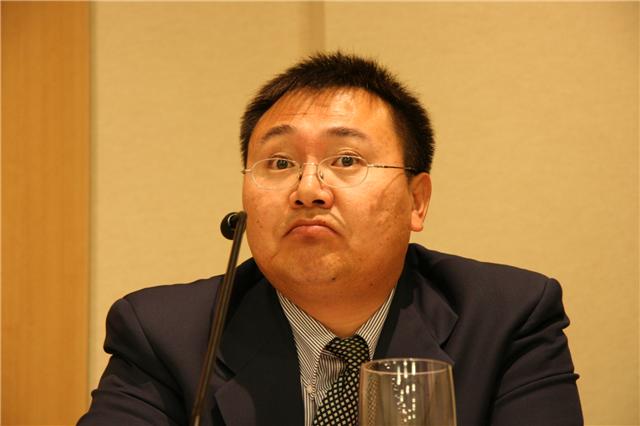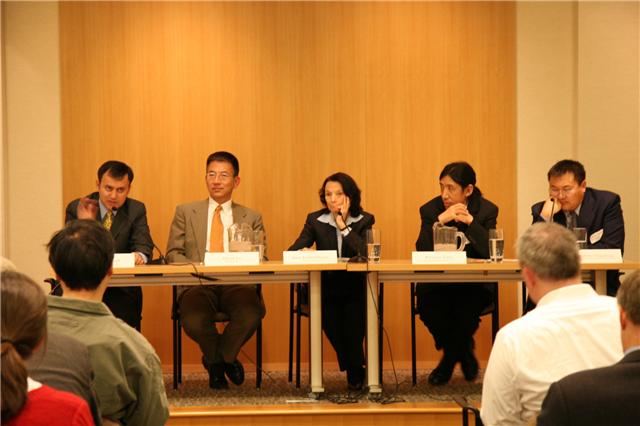 |
|
|
Enghebatu Togochog,
President of SMHRIC,
speaks at the "Ethnicity
with Chinese
Characteristics? The
Chinese State and
Tibetan, Uyghur and
Mongol Identities"
Conference. (Voice of
America Photo)
|
|
 |
|
|
Panelists of the
"Ethnicity with Chinese
Characteristics? The
Chinese State and
Tibetan, Uyghur and
Mongol Identities"
Conference. (Voice of
America Photo)
|
Good afternoon, ladies and gentlemen,
My name is Enhebatu Togochog, and I represent the Southern Mongolian Human Rights Information Center, a New York based human rights organization dedicated to protect and promote the rights of the Mongols in China.
It is my great honor to be here to discuss the situation of our people, in particular China’s policies of political oppression and cultural assimilation toward the Mongols in Southern Mongolia.
Historically, the geographical area of Southern Mongolia includes not only the so-called “Inner Mongolia Autonomous Region” but also large parts of Huhnuur which Tibetans usually call “Amdo”, Dzungaria which is usually made a part of Eastern Turkistan and parts of other provinces as well. In Mongolian, Southern Mongolia is called “Uvur Mongol” which is just a geographical term referring to the territory south of the Gobi Desert that is an integral part of Mongolia proper. There is no meaning of “Nei” or “Inner” in the Mongolian word “Uvur” at all.
The Pre Olympic Crackdown
Detention and harassment
Many Mongols as well as people around the world hoped that the Beijing Olympics will bring some positive changes to China’s ever-worsening human rights practice as China promised to improve her poor human rights record. The Olympics is over, nothing has been improved. In fact, the situation has deteriorated.
Under the pretext of “cleaning up” before the Olympics, the Chinese authorities launched a region-wide pre-game crackdown in Southern Mongolia. Mongolian dissidents and activists were arrested, detained and sent to jail. For example, Mr. Jaranbayariin Soyolt, a Southern Mongolian dissident in exile and a citizen of Mongolia, was arrested at Beijing Airport and detained for 5 months without trial before he was deported back to Mongolia due to his political opinion and involvement in alleged “separatism”; Mr. Naranbilig, a free-lance journalist and an indigenous rights advocate, was arrested and put under one-year house arrest for defending the indigenous rights of the Mongols; another activist Professor Tsebegjab was also arrested and put under house arrest for similar reason.
Family members and relatives of political dissidents have been threatened and harassed during the pre-game crackdown. Mrs. Xinna, wife of prominent political prisoner Mr. Hada, and her son Uiles were monitored and followed by the Public Security personnel 24/7 and frequently harassed by police; a brother of Mr. Naguunbilig was threatened by the Public Security personnel not to reveal anything about his brother who was sentenced to 10 years in jail along with his wife Daguulaa who was sentenced to 5 years in jail for practicing “illegal cult” or the so-called “Mongolian version of Falungong”; wife of Mr. Naranbilig was ordered by the Public Security personnel to tell people if asked that her husband is in a “business trip to somewhere” not under house arrest. Many dissidents were either forced by the local police to leave the place where they live or ordered to stay home during the Olympics. For example, Ms. Huuchinhuu, a dissident writer, was forced to leave her hometown Tongliao City and not allowed to return even after the Olympics.
Suppression of ethnic cultural expression
Under the pretext of “purifying” the cultural market before the Olympics, the authorities in Inner Mongolia Autonomous Region (IMAR) have confiscated thousands of Mongolian books, magazines, CDs and even T-shirts and handkerchiefs with Mongolian letters printed on them. Mongolian souvenir knives that were sold in many Mongolian souvenir stores have been confiscated by the authorities as “criminal weapons”. It is safe to say that anything showing or emphasizing Mongolian culture, tradition and identity is regarded by the Chinese authorities as harmful elements that might undermine the ethnic harmony of China.
Freedom of movement
Mongols’ right to travel has been severely restricted both during and after the Olympics. Ethnic Mongols who traveled to Chinese cities like Beijing and Shanghai were not allowed to stay in hotels. For example, prominent Mongolian scholar and Professor Dr. Chimeddorj was refused a room at a hotel in Beijing upon showing his ID card that identifies him as an ethnic Mongol; a Mongolian businessman who traveled before the Olympics was not allowed to stay a hotel in Beijing, but told to stay in a suburban cheap motel. During his stay in Beijing, he was called on his cell phone every 30 minutes to report his whereabouts and what he was doing.
The Post Olympic Situation
All these oppressive restrictions towards the Mongols before and during the Beijing Olympics have not been lifted following the Olympics. Rather, it seems that they used the pretext of the Olympics to carry out these repressive tactics as a trial run, and having proven effective. They seem to have decided to make these permanent. Surveillance of Mongolian dissidents and their family members continue to be strictly maintained; Mongolian knives are still not allowed to be sold; Mongols who travel in Chinese cities are still not allowed to room in a quality hotel. A Mongolian elderly couple traveled to Shanghai just a month ago and was denied a hotel room in Shanghai due to their Mongol ethnicity shown on their ID cards.
Forced displacement and cultural assimilation over the past decade
In addition to these oppressive and discriminatory policies toward the Mongols, the Chinese authorities have sped up the pace of assimilation through forced physical displacement and economic marginalization of the Mongols. Intensifying the previously adopted policies such as “ecological migration”, “transforming the rough and backward way of life” and “quick urbanization”, the Chinese authorities have recently come up with a series of new slogans including “two transformations - two wins” (“Liang Zhuan Shuang Ying” in Chinese). Initially adopted in 2003 and fully implemented last year in Inner Mongolia Autonomous Region’s Shiliin-gol League, this policy has the following goals:
1. Relocate the entire Mongolian herder population from their traditional grazing lands under the name of “protecting and preserving the grassland ecosystem”;
2. Completely transform the traditional Mongolian way of life to urban or agricultural sedentary ones under the rubric of “improving the herders’ living standard”;
Under this policy, Mongolian herders must give up their traditional way of life and move to agricultural or urban areas where the Chinese population is overwhelmingly majority. In the short term, those relocated Mongolian herders who have no marketable skills or political connections to survive in the Chinese cities will become jobless and homeless people, their children will lose the opportunity to learn their own language at school, and they will endure tremendous economic hardship, psychological and emotional trauma through this forced displacement. In the long run, the Mongolian population will be completely assimilated into the Chinese society, and Mongolian culture, language and identity will be totally eliminated.
Response to China's policies
In response to China’s systematic and state-sponsored population transfer and cultural assimilation policies, Mongols have been struggling to maintain their own identity and culture. In fact, the majority of Mongolian dissidents and activists who have been targeted and arrested by the Chinese authorities have been engaged in nothing but defending the Mongols’ rights to practice their culture, language, traditions and pursuing their distinct identity. Unfortunately, all these legitimate calls by the Mongols have been regarded by the Chinese authorities as “elements harmful to ethnic harmony” and sometimes even considered as “separatism” and therefore subject to severe punishment even though the Chinese Constitutions and the Ethnic Region’s Autonomy Law guarantee some degree of rights and freedom of the minority groups.
China’s de facto zero-tolerance to ethnic differences and lack of rule of law mean that for the ethnic minorities there is little option to challenge these gross violations of their human rights. Their future is bleak, and the only choice left for the minority groups might be a complete assimilation into a homogenous Chinese society and becoming members of the equally oppressed zhong guo ren (the Chinese people).
Appreciation for diversity is not a concept that the Chinese authorities have any respect for and in that sense, China has not risen to the level of expectation that one can have for a modern, multi-ethnic nation that respects the rights of its citizens.
Thank you,
Enhebatu Togochog
Southern Mongolian Human Rights Information Center
68-37 108th Street, 6A Forest Hills NY 11375 U.S.A. Tel/Fax : 001-718-786-9236 Email : enhebatu@smhric.org Website: www.smhric.org






